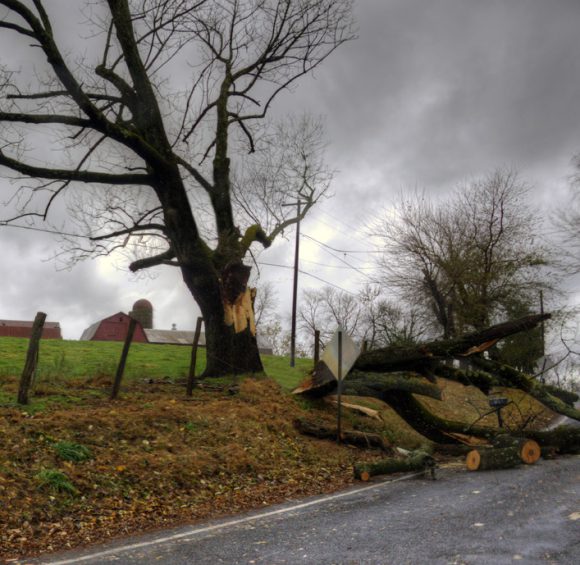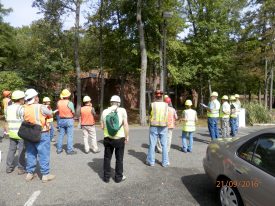
Tree damaged from Hurricane Sandy in Clinton Township, NJ. Photo by Penny Carlson, Rutgers SEBS
Natural disasters cause significant damage each year to our urban forests, with the resulting assessment and cleanup responsibilities a challenge for many communities. For instance, New Jersey is in the top 10 states in terms of urban tree volume, which equates to more risk for residents in the face of powerful storms like Hurricane Sandy.
The Urban Forest Strike Team (UFST) provides training and assistance to practitioners and communities on urban tree damage assessment following natural disasters. Strike Teams may make tree risk assessments of damaged, standing trees, assist communities with debris estimation, identify and evaluate tree planting sites for short and long-term recovery, and provide training to qualified local and state arborists in disaster situations.
An Urban Forest Strike Team – Task Specialist Training was held at Rutgers Cook Campus on September 21 and 22. The training was sponsored by the New Jersey State Forest Service Community Forestry Program, Rutgers Urban Forestry Program, Massachusetts Tree Wardens’ and U.S. Forest Service.

“Field Exercise 1” of the training involves reviewing, discussing, and practicing tree risk protocol as a group. Photo by Fred Borman
Training for Task Specialists involves three online courses and a 2-day in-person workshop. It provides an overview of the Urban Forest Strike Team initiative, training on FEMA Standards, review of tree risk assessment criteria, the UFST tree risk assessment protocol, use of GPS equipment, and practice using the protocol in a mock disaster scenario (multiple field exercises). Training is provided by experienced UFST Team Leaders and local, state, or federal urban foresters.
The UFST program was initially developed by State forestry agencies and the U.S. Forest Service in the Southern region of the U.S. and is now being implemented in the Northeastern, Mid-Atlantic and Midwestern states. UFST involves recruiting, training and deploying professional urban foresters and arborists to assess tree damage using FEMA and tree risk assessment standards. The assessments help communities plan needed recovery work and document the amount of damage and cost of clean-up. UFST members (Task Specialists) attend a two-day training workshop and obtain continuing education via webinars and online courses. Upon completion of the training, Task Specialists are placed on a roster to be contacted if a local, state, or regional UFST is requested.

